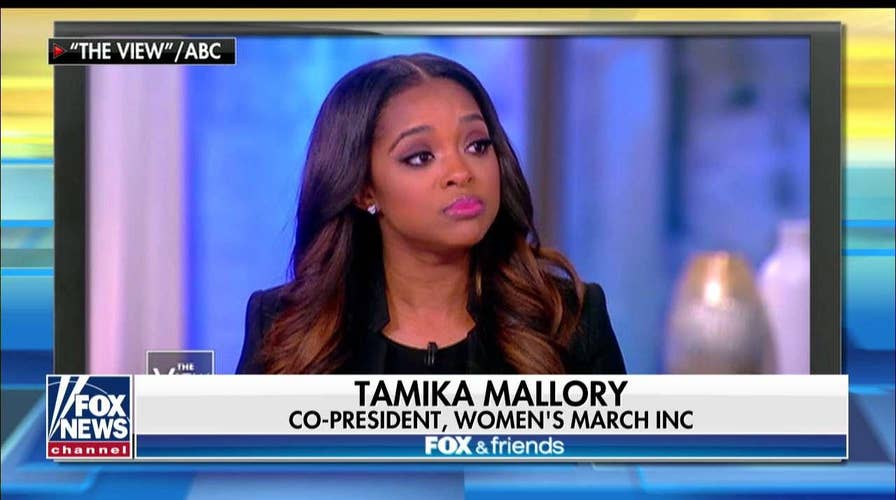It’s been nearly two years since women came out in droves to protest President Trump. And in light of Trump’s two-year anniversary in the White House, there will be protests once more.
While the main march will take place in Washington, D.C., so-called "sister" marches are slated to take place in hundreds of cities both in the U.S. and beyond on Jan. 19.
‘THE VIEW’ GRILLS WOMEN'S MARCH CO-FOUNDER TAMIKA MALLORY OVER TIES TO LOUIS FARRAKHAN
"It's time to march again. The 2017 Women’s March inspired hundreds of women to run, millions more to vote, and dozens to win elected office. The 2019 Women’s March marks two years of resistance to the Trump presidency, two years of training new activists, and two years of building power. And this time, we're coming back with an agenda," the Women's March states on its website, adding in a separate statement that those participating this year will gather in the nation's capital "to affirm our shared humanity and pronounce our bold message of resistance and self-determination."
Ahead of the Women’s March events this weekend, here’s what you need to know.
What is it?
The Women’s March, which was first held on Jan. 21, 2017, was a response to Trump’s White House win. Thousands of women in Washington, D.C. and in cities across the U.S. and world used the day to advocate for women and human rights issues, which protesters argued would face adversity under the new administration.
The idea was first sparked by a Hawaii retiree named Teresa Shook, who took to Facebook just hours after Trump’s election. She asked a few friends via the social media platform to march on Washington with her in protest.
Bob Bland, a New York fashion designer who is now one of the organization’s national co-chairs, joined the call to action with her own message: “Who wants to join me?!?” she asked.
And with that, the Women’s March was born, soon to become the largest coordinated protest in the country’s history, according to the organization’s website. Additionally, the march in Washington in 2017 was about three times the size of the crowd at Trump’s inauguration, crowd scientists said at the time.
Other national co-chairs include Linda Sarsour, Tamika Mallory and Carmen Perez, among others.
How is this year different than previous years?
The organization has been under fire after an expose in the online Jewish publication the Tablet alleged some of the group's leaders — namely Mallory and Perez — have used anti-Semitic rhetoric during meetings with other women's march officials. The comments allegedly caused Vanessa Wruble, a Jewish co-organizer, to leave the group. Mallory and other women's march organizers have denied the accusations.
Later, the organization issued a statement that, in part, said it "exists to fight bigotry and discrimination in all their forms — including homophobia and anti-semitism — and to lift up the voices of women who are too often left out."
Mallory faced backlash once more after she said Louis Farrakhan, the controversial Nation of Islam leader, is the “greatest of all time because of what he’s done in black communities.” Farrakhan is known for openly making anti-Semitic comments, once saying he is not "an anti-Semite. I'm anti-Termite."
In a recent interview on ABC's "The View," Mallory was grilled by the show's conservative voice, Meghan McCain, regarding her support of Farrakhan.
“What I will say to you is, I don’t agree with many of Minister Farrakhan’s statements,” Mallory said.
McCain asked if she specifically disagrees with Farrakhan's rhetoric about Jewish people — to which Mallory said she doesn’t agree.
McCain asked, “Do you condemn them?”
Mallory refused to condemn the remarks and simply repeated that she doesn’t agree.
DEMOCRATIC NATIONAL COMMITTEE WILL NOT SPONSOR WOMEN’S MARCH AMID ANTI-SEMITIC CONCERNS
“You won’t condemn it,” McCain pointed out.
“To be very clear, it’s not my language. It’s not the way that I speak,” Mallory said.
Not long after the interview, the Democratic National Committee announced it would not sponsor the Women’s March, citing anti-Semitic concerns.
"The DNC stands in solidarity with all those fighting for women's rights and holding the Trump administration and Republican lawmakers across the country accountable. Women are on the front lines of fighting back against this administration and are the core of our Democratic Party," DNC Deputy Communications Director Sabrina Singh told Fox News this week, making clear the organization still supports the cause of women's rights even as it keeps a distance from the group itself.
The DNC is not the only organization to withdraw its sponsorship of the group. EMILY'S list, along with the Southern Poverty Law Center, the Human Rights Campaign, among others, are also no longer listed as sponsors this year following the controversy, the Daily Beast reported, noting that "less than half of the nearly 550 partners listed in 2018 have returned to support the third march."
Fox News' Brian Flood and The Associated Press contributed to this report.













































